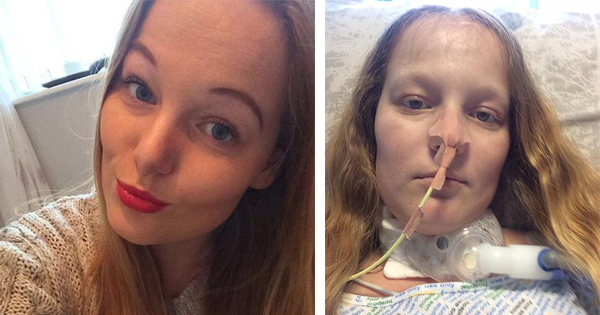Advertisement
In the beginning of April, 19-year-old Jess Lewin began to develop a sore throat which she simply brushed off as being another cold symptom. After a few days of rest, however, her throat didn’t improve, so she went to the doctor, who also suspected she was coming down with a serious cold.
Again, Lewin returned home with medication and orders to drink water and rest – but still, her condition only got worse.
A week later, Lewin’s mother, Tina Spanton, insisted that Lewin go see her doctor.
At this point, Lewin was complaining of feeling “dehydrated, dizzy, and…ha[ving] a lot of sickness and diarrhea. It was getting progressively worse.”
“I can honestly say that, in the week running up to it, it really felt like I was dying,” Lewin admitted later. But she never voiced these concerns to anyone, fearing that they would simply tell her to stop being so dramatic.
But Spanton didn’t care. She took Lewin to the doctor, and then to the hospital, where a CT scan revealed that Lewin was suffering from a serious blood infection: sepsis.
The doctors immediately sent Lewin into emergency surgery to remove her left ovary and put her on breathing support to keep her alive.
When Lewin finally woke up, ten days later, after the procedures, she couldn’t remember what had happened. Her last memory was of going to the hospital, but she had no recollection that she had already gone under the knife and went through two surgeries.
Lewin remembered asking her mom, “When do I get to go home?”
Her nurse could only tell her, “It will be weeks, not months.”
Staying in the hospital was the last thing Lewin wanted to do; she just wanted to get better and begin to walk again. “I was an 18-year-old girl and not being able to get into bed really freaked me out. It made me feel like a 90-year-old,” she explained.
Now, though Lewin’s hair is still incredibly thin from her time spent recovering in the hospital, she is doing much better than she was before. She was able to hold her older sister’s newborn son, can live at home (but with assistance), and has returned to her office job.
Now, Lewin is hoping to raise awareness about sepsis, “There are so many people that don’t know what sepsis is. To be honest, I didn’t before I got it. The symptoms are a lot like the flu, but they can be so much worse.”




